L’italiana in Londra
L’italiana in Londra. “Intermezzo in musica” in two parts by Domenico Cimarosa. Text by Giuseppe Petrosellini. Oper Frankfurt.
Performance attended: November 5, 2021.
Livia: Angela Vallone
Madama Brillante: Bianca Tognocchi
Sumers: Theo Lebow
Milord Arespingh: Iurii Samoilov
Don Polidoro: Gordon Bintner
Statisterie der Oper Frankfurt
Frankfurter Opern- und Museumsorchester
Muziek : *4,5*
Regie: *4*
You can have any review automatically translated. Just click on the Translate button,
which you can find in the Google bar above this article.
The name Domenico Cimarosa, what does it mean these days? Sure, we know Il Matrimonio segreto, the only one of his 60 or 70 operas that is still performed. And we’re familiar, often unknowingly, with his oboe concerto. It has found its way into film, advertising and documentary music, and is among the many themes from classical music that have been chewed into a cud and regurgitated. There’s Dr. Oetker, who uses “La Donna è mobile” from Rigoletto to sell the virtues of its pizzas. Pampers feel most at home with Also sprach Zarathustra by R. Strauss, and McDonalds, in turn, likes to bond with Liszt, Liebestraum “O lieb so zu lieben kannst” and the Mondscheinsonate.
But films and documentaries also like to use classical melodies. Out of Africa (1985) is supported by the adagio from Mozart’s Clarinet Concerto in A major, K. 622, and Death in Venice (1971), based on Thomas Mann’s novella Der Tod in Venedig, uses a generous helping of Mahler’s Third and Fifth Symphonies, especially the Adagietto from Mahler V, which is gradually being absorbed by the André Rieu universe.
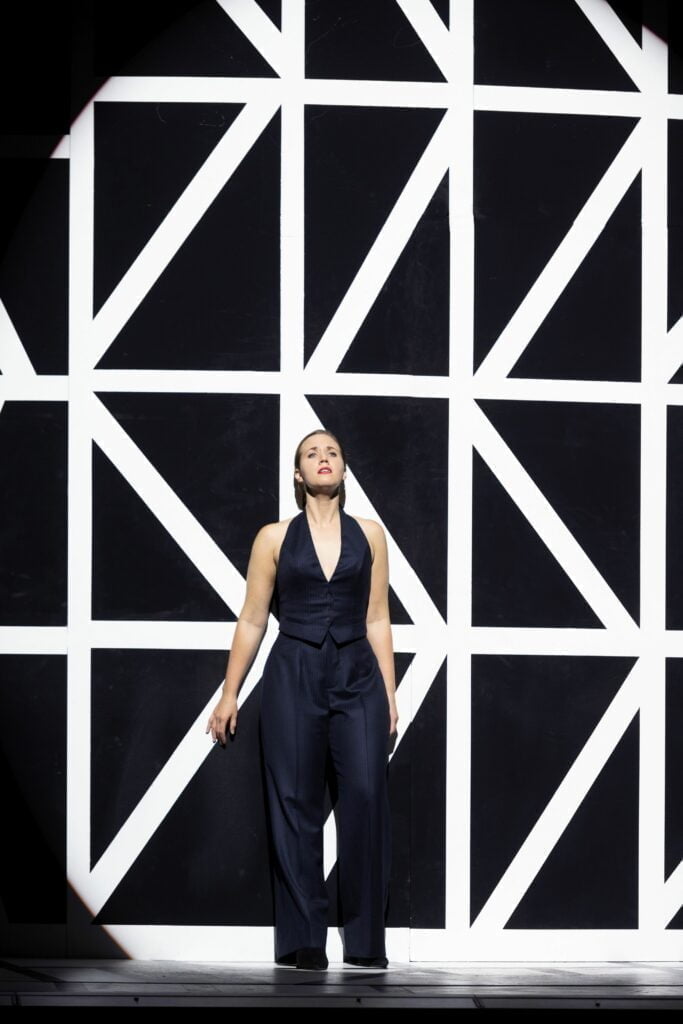
Raging Bull was embellished with the Intermezzo from Cavalleria Rusticana. This was a downright exquisite choice of music to accompany one of the most spectacular scenes in film history (besides The Chariot Race from Ben-Hur) : the helicopter attack in Apocalypse Now was cheered on by the “The Walkurenrit”. Should we ever find ourselves in the position of having to choose between Apocalypse Now and Debussy’s Pelléas et Mélisande for our evening out, there is no doubt: it will be Apocalypse Now! (And if we have to choose between Pelléas et Melisande and staying home it will be: staying home with a bottle of Very Old Gin.)
Cimarosa’s very fine oboe concerto will probably also be familiar to you. It is played in the Iranian film Through the Olive Trees, by the Iranian film director Kiarostami, but mainly in documentaries with a sad or “the human being-central” theme: e.g. the demolition of a village church, the destruction of a city, the asylum seeker wandering around looking for a piece of humanity, the end of a family business whose oldest, 112-year-old member is delivering milk for the last time, the old and broken Louisiana Creole grandmother who lays flowers on the grave of her enslaved favorite great-great grandmother, etc. etc. Yes, that’s when the first movement of Cimarosa’s oboe concerto comes in handy!
Domenico Cimarosa (Aversa 1749-Venice 1801) was especially popular in his day for his comic operas. He received his first music lessons in a convent. After his conservatory training in Naples, Cimarosa found employment as an organist in the Neapolitan royal chapel. Naples was also where he premiered his first opera, Le stravaganze del conte (1772). He was particularly appreciated as an opera composer, and admired by Haydn and Goethe, among others. His music resembles that of Mozart, “yet doesn’t have…” (fill in as you see fit). Otherwise, consult the classical music connoisseur in your place of residence. After spending a period in Russia at the court of Catherine II (1787-1791), Cimarosa returned to the Kingdom of Naples.
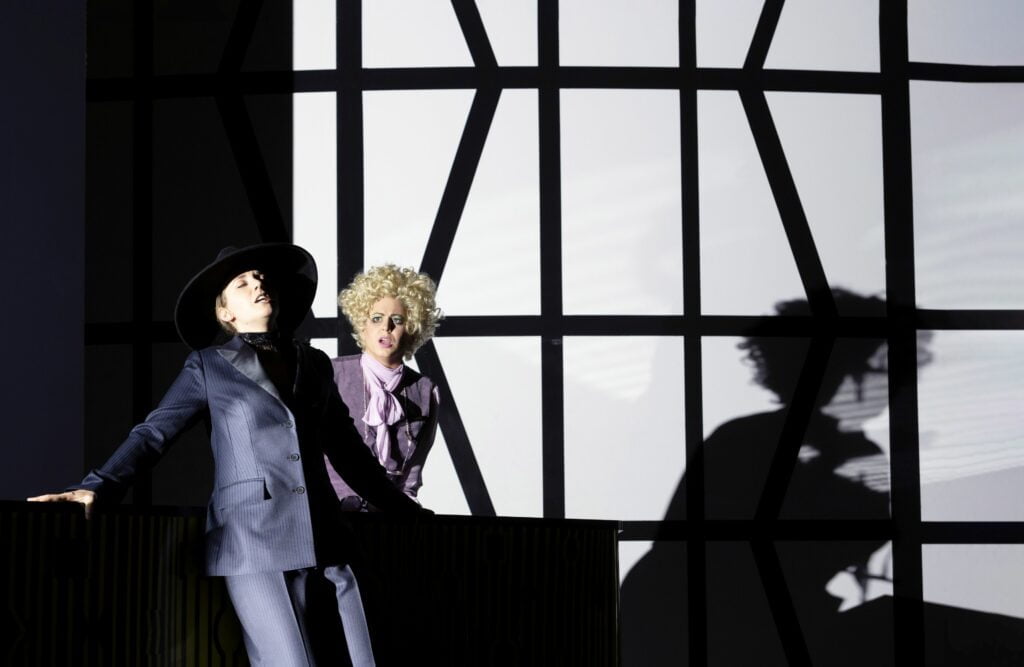
In his heart, however, he was a republican, and when the French forces took Naples in 1799, he joined them anyway. However, when Ferdinand returned to power, Cimarosa ended up in prison. He was only just saved from the death penalty by the intervention of a few cardinals. He left Naples and died in Venice.
Although Domenico Cimarosa was one of the most frequently performed composers in all of Europe at the end of the 18th century – Joseph Haydn, for example, conducted thirteen of his operas in Esterházy between 1783 and 1790 – his works are almost completely absent from the operatic repertoire today.
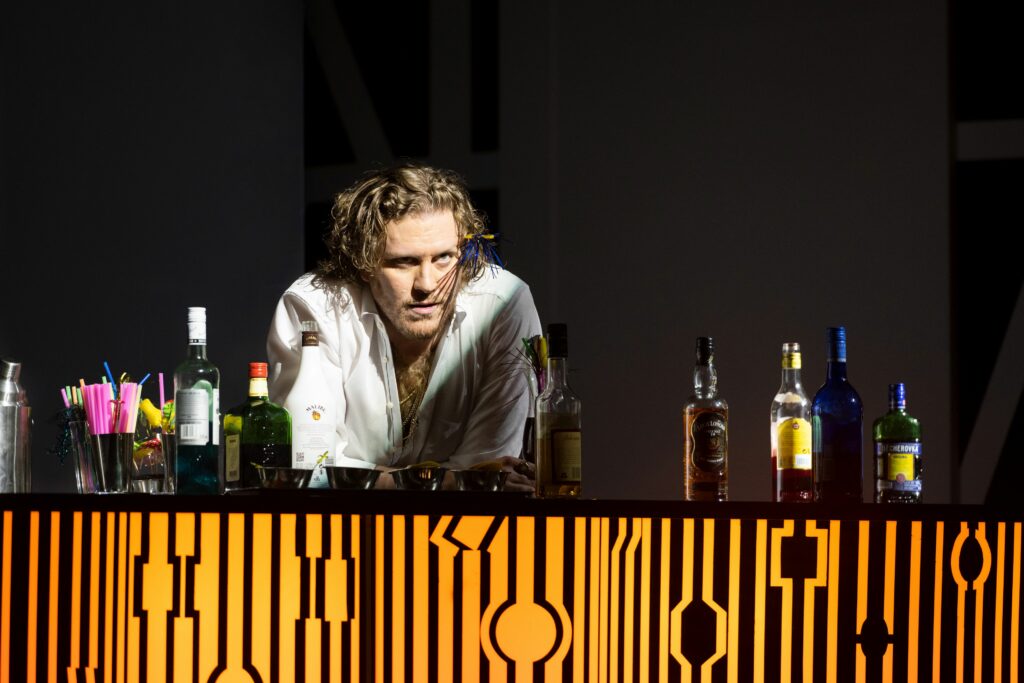
As said, he is in fact only known for his “dramma giocoso” Il matrimonio segreto, which is still performed. But his international breakthrough actually came several years before Il matrimonio, with L’italiana in Londra, an opera which music connoisseurs describe as strongly reminiscent of Rossini and Mozart. We were unable to detect Rossini, though we did detect Mozart, but without the hand of the master, especially in the arias. After its successful premiere in 1778 at the Teatro Valle in Rome, the work was soon performed all over Europe.
And now in Frankfurt they have decided to give Cimarosa’s L’italiana another chance. That’s certainly justified musically. But let’s not suddenly pretend that every undiscovered or seldomly played opera is an underexposed masterpiece. L’italiana in Londra is not a masterpiece
Madama Brillante, in times of war, runs a hotel in London. At one point, a dejected, a gruff English Lord (Arespingh), a clever Dutch merchant (Sumers) and a flamboyant Neapolitan (Don Polidoro) stay there. The Italian girl Livia arrives from Genoa but claims to be from Marseilles; she pretends to be Madama’s French waitress, “Henriette”. Arespingh faces the terrible prospect of having to marry a certain Diana, a bride chosen by his father, instead of his beloved Livia whom he had to leave behind in Genoa. Meanwhile, Madama Brillante has a crush on Don Polidoro, but Don Polidoro, in the best operatic tradition, falls for Livia. The action takes place in one day: there are quarrels, entanglements with an invisibility stone, and other misunderstandings, but “at the end of the day” everything is resolved. It also becomes known that the war is over, and everyone celebrates peace.
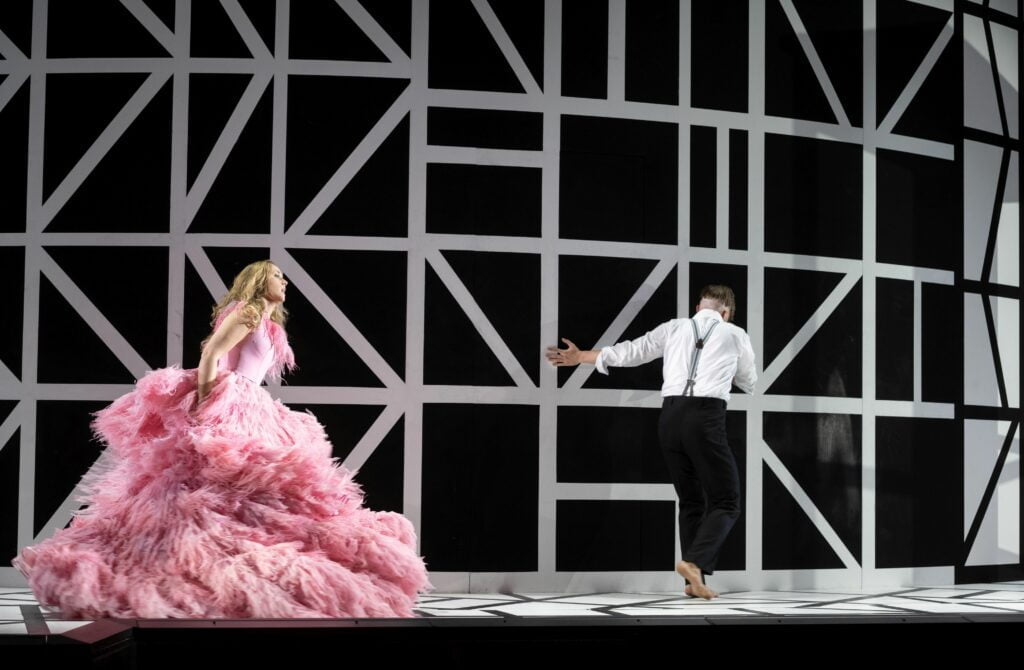
The evening in Frankfurt began with an overture played with the curtain closed. That’s good for an hour of goodwill. Director R. B. Schlather kept up the momentum and almost turned it into a slapstick comedy, when perhaps a little less frenetic and uproarious direction would have been more appropriate. Dominus se ostendit in limitatione (‘it is in restraint that the master is revealed’ always applies, here too). The setting was decidedly dull: a hotel in a circular, revolving construction with alternating white and black areas. It is, of course, inconceivable that a comedy set in a hotel would also be set on stage in a recognizable hotel. The clichés this time: a cell phone, while a phone booth (?) also played an important role, sunglasses, a cigarette. On the other hand: the English lord had a bowler hat, the Italian was draped with gold chains and had a chest rich in vegetation. The Dutchman, of course, was a stiff rake. Madama Brillante was played by Bianca Tognocchi. She possesses a round, full and carrying soprano, and in the end, that’s all that matters. She vaguely reminded me of Kiri Te Kanawa. Vaguely. Angela Vallone took on the title role with excellent acting; a supple, agile coloratura soprano from the top shelf of the soprano closet. Iurii Samoilov (Milord Arespingh) has an energetic baritone with which he reinforces his amorous intentions, and Theo Lebow (Sumers), a great comic talent, portrays a bizarre Dutch merchant. Doesn’t matter whether it’s the colonies, the Football World Cup or the former Dutch property Belgium, the Dutchies are always left empty-handed. Gordon Bintner (Don Polidoro), a virile baritone and a great comedian, is the typical Italian macho who, because Italian, has it in for the females.
Leo Hussain had his Frankfurter Opera Orchester playing in a spirited and cheerful way. The freshness of Italian limes swept through the hall. In our opinion, with L’italiana in Londra, the Oper Frankfurt has brought a most charming production to the opera stage.


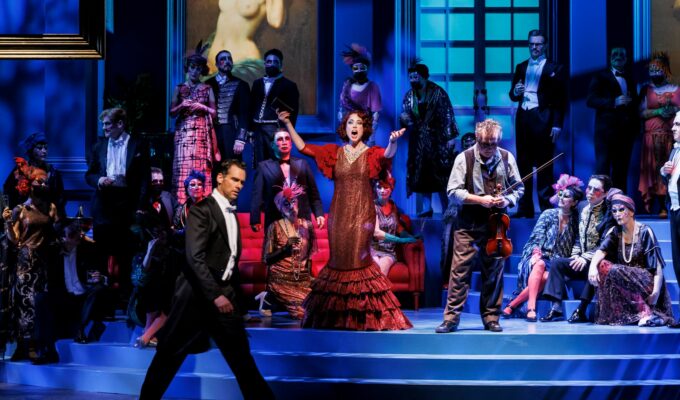
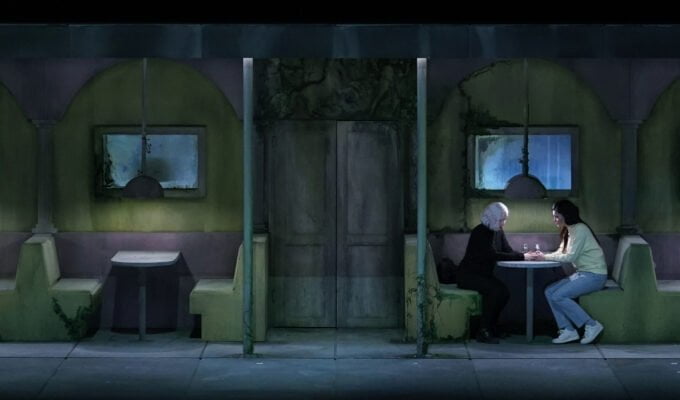


Een prachtig artikel, Olivier, met doortimmerde achtergrondinformatie.